How to Clean Your Aircon for Optimal Performance
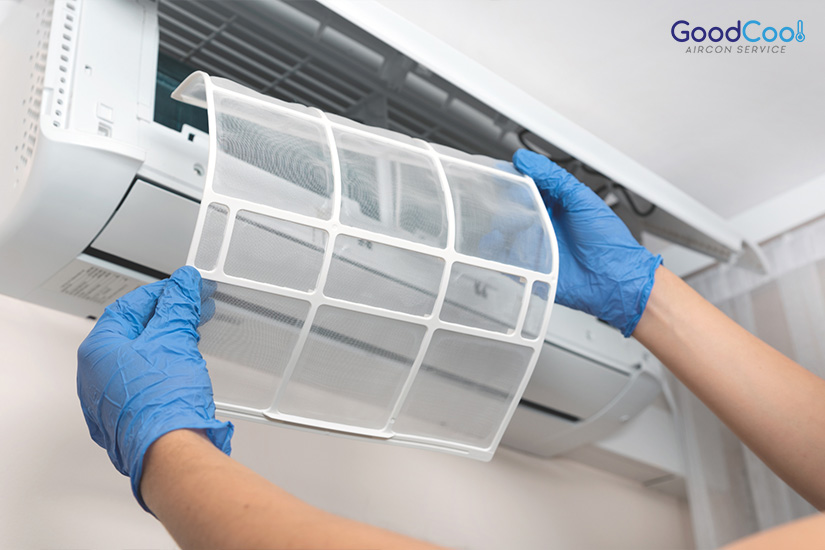
In Singapore’s tropical climate, air conditioning has become an essential part of daily life. However, the constant battle against humidity and dust, as well as frequent usage, can take a toll on your air conditioner’s performance and longevity. This is where regular and thorough cleaning becomes crucial, preventing expensive repairs, maintaining your unit’s performance, and keeping the air quality in your home or business high.
Join us as we take a deeper look at the various ways to keep your aircon clean, from DIY methods to professional services.
Aircon Care Essentials: From DIY to Professional Help
The Dangers of a Dirty Air Conditioner
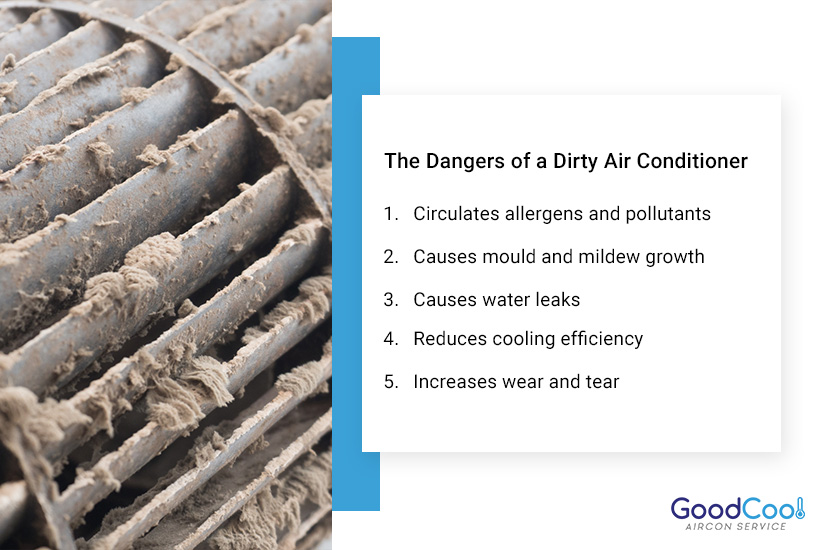
Without regular cleaning, a dirty air conditioner can harbour surprising amounts of dust, grime, mould, and bacteria. This can cause a variety of problems, including:
1. Allergens and Pollutants
A dirty air conditioner may contain and circulate a variety of allergens and pollutants, such as dust mites, spores, and bacteria. These contaminants not only compromise indoor air quality but also trigger allergies or even exacerbate respiratory issues like asthma.
2. Mould and Mildew Growth
The damp environment inside an air conditioner is an ideal breeding ground for mould and mildew. Accumulated moisture can lead to the rapid growth of these fungi, causing further damage to both the unit and the structure of your home. Mould and mildew growth can also compromise air quality, causing unpleasant odours and health problems.
3. Water Leaks
Lack of regular maintenance can lead to clogged drainage systems, which can cause water to back up and leak into your home. This can lead to substantial damage to walls, ceilings, and furniture, resulting in repair costs that can be more expensive than that of a certified aircon cleaning service.
4. Reduced Cooling Efficiency
The accumulation of dust, grime, and debris on the air filters, coils, and fins can obstruct airflow, causing the air conditioner to work harder to reach the desired temperature. This reduced cooling efficiency not only strains the system but also increases energy consumption, leading to higher utility bills.
5. Increased Wear and Tear
Dirt and debris can put undue strain on the various parts, including the fan motor, compressor, and condenser coils. The increased stress accelerates wear and tear, leading to more frequent breakdowns and a shorter lifespan for your system.
DIY or Professional Cleaning: Which Should You Choose?
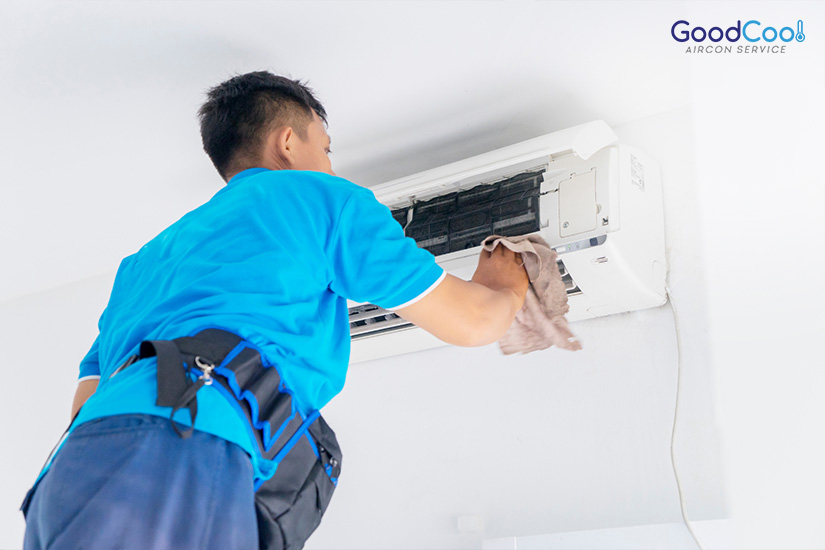
When it comes to keeping your aircon clean, you have two options: DIY (Do It Yourself) cleaning or expert services. Let’s explore when each approach is most appropriate.
When to Choose DIY Aircon Cleaning
1. Simple Tasks
DIY cleaning is typically sufficient for routine tasks like cleaning or replacing aircon filters, wiping down the exterior of the unit, and clearing debris from around the outdoor condenser. These actions do not require specialised tools and can be easily performed at home with minimal expertise.
2. Cost Constraints
For those on a budget, DIY cleaning is a more affordable option compared to professional services. It allows you to tackle minor issues and maintain your air conditioner’s basic cleanliness without incurring additional costs.
3. Immediate Action for Minor Issues
When minor issues like decreased airflow or slight noises arise, DIY cleaning can be a quick solution before scheduling expert help. This can help alleviate discomfort or inconvenience while you wait for an appointment.
When to Opt for Cleaning Services
1. Comprehensive Maintenance
Deep cleaning services, such as an aircon chemical wash, are ideal for tackling hard-to-reach areas and stubborn grime that simple DIY methods might miss. Trained technicians possess the necessary expertise and specialised tools for a deep clean, ensuring that all components of your air conditioning system are thoroughly maintained.
2. Complex Systems
If your unit is complex or involves multiple units, it’s advisable to rely on experts who have the skills and tools necessary for thorough maintenance. These hired experts can handle complex systems efficiently and safely, preventing potential damage or malfunctions.
3. Preventive Care
Scheduling maintenance is crucial for preventive care and the long-term health of your aircon. Issues can be detected and addressed promptly before they escalate into major problems. This helps keep your air conditioner in optimal condition, extending its lifespan and reducing the need for costly repairs.
4. Major Issues
If your air conditioner is leaking, making unusual noises, or demonstrating drastic reductions in cooling efficiency, it’s best to seek expert help. These issues often indicate underlying problems that require expert diagnosis and repair. A qualified technician will be able to identify the root cause of these problems and provide the necessary repairs to prevent further damage and ensure smooth operation.
5 Aircon Cleaning Mistakes to Avoid
For those interested in a DIY operation, here’s a list of what to avoid when cleaning your aircon.
1. Neglecting the Outdoor Unit
Many homeowners overlook the importance of a clean outdoor aircon unit, which plays a vital role in cooling efficiency. The outdoor condenser unit is exposed to the elements and can accumulate debris, obstructing airflow and hindering the unit’s performance. Remove this debris and clean the condenser coils regularly to keep the unit operating efficiently and prevent overheating.
2. Using Harsh Chemicals
Harsh chemicals and strong cleaning agents can damage the sensitive components and potentially degrade the aircon’s performance. Instead, opt for mild detergents specifically formulated to be gentle on delicate parts while effectively removing grime and dirt. In addition to this, make sure to use an appropriate amount of chemicals, as excessive use can leave harmful residues that further impair the unit’s function.
3. Ignoring the Drain Pan
The drain pan manages condensation from your air conditioning system, and any obstructions can cause water backups and leaks. Inspect the drain line regularly and clear any blockages using a vacuum or a specialised drain cleaner.
4. Overwatering the Evaporator Coil
The evaporator coil, where the refrigerant absorbs heat from indoor air to cool it, should be cleaned regularly. However, it’s important to avoid spraying water directly onto the fins, as this can damage electrical parts and cause short circuits. To clean your aircon coils safely and effectively, it’s best to use a soft brush or specialised coil cleaner.
5. Forgetting to Dry Components
It’s important to dry all components thoroughly before reassembling the unit. Moisture left on the evaporator coil, drain pan, and fan blades can foster mould growth and cause unpleasant odours. You can use a soft cloth or towel to absorb excess moisture to speed up the drying process.
Professional Aircon Cleaning Services 101
Alternatively, if you prefer to entrust your air conditioner to the experts, we’re here to guide you. Discover the recommended cleaning frequency for your air conditioner and essential preparation tips to ensure a hassle-free experience.
How Often Should You Clean Your Aircon?
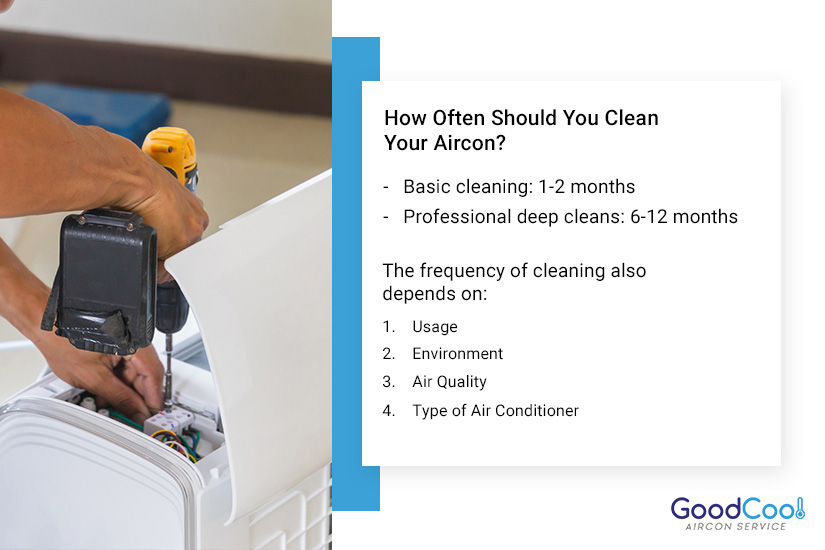
In general, basic cleaning tasks, including cleaning or replacing air filters, should be performed every 1 to 2 months. On the other hand, deep cleaning and chemical overhauls should be scheduled every 6 to 12 months, or when the unit’s performance declines noticeably.
In addition to this, the frequency of cleaning can also be influenced by several factors:
1. Usage
Air conditioners that are in constant use, especially in Singapore’s hot and humid climate, will need to be cleaned more often. Regular use accelerates the accumulation of dirt, dust, and grime, which can impact the unit’s performance and efficiency.
2. Environment
The cleanliness of your unit also depends on its surrounding environment. Areas with high levels of pollution or dust will necessitate more frequent maintenance to prevent buildup and ensure optimal performance.
3. Air Quality
If you or someone in your household has allergies or respiratory issues, more regular cleaning is recommended. This will help to remove allergens, dust mites, and other contaminants, improving indoor air quality and reducing exposure to these harmful particles.
4. Air Conditioner Type
Different aircon types and systems may have varying maintenance needs. For example, commercial units, which experience higher usage and stress, may need expert maintenance every 3 months to handle the increased workload. This regular upkeep helps extend the lifespan of the unit and maintains its performance under demanding conditions.
How to Prepare Your Aircon for a Professional Clean
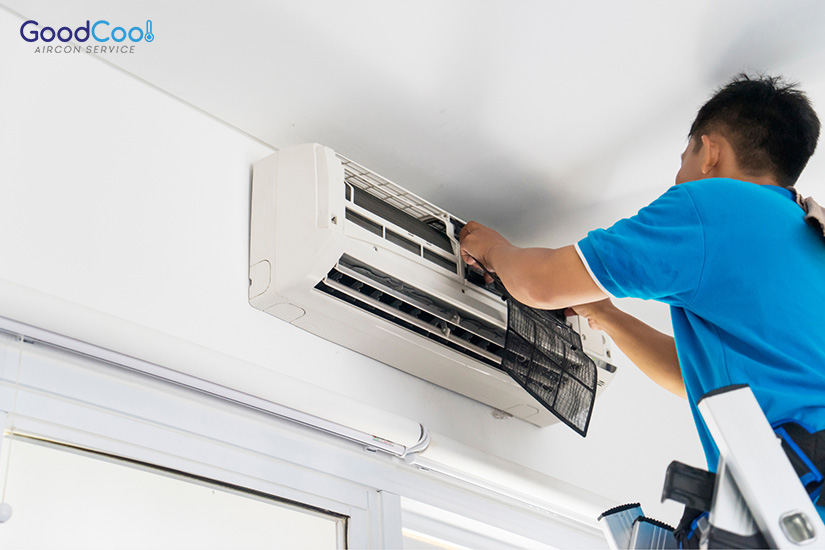
After you’ve booked a cleaning service with a qualified technician, preparing your unit ahead of time can facilitate a smoother service. Here are some simple steps you can take.
1. Clear the Area
Before the technician arrives, clear the area around the unit by removing obstacles like furniture, decorations, or other items. This will provide ample space for them to work. Covering nearby furniture and belongings with sheets or plastic will also protect them from dust and debris generated during the cleaning process.
2. Provide Access
Keep any doors or access panels to your air conditioner unit unlocked and easily accessible, allowing the technician to reach and inspect all components without any unnecessary delays. If your air conditioner is installed in a difficult-to-reach location, such as a high ceiling or a tight space, inform the technician beforehand. This will help them prepare with the appropriate tools and equipment.
3. Turn Off the Power Supply
Before cleaning, ensure that the system is switched off to prevent any risk of electrical shock or damage. Depending on the type of cleaning service performed, you might also need to turn off the power supply at the circuit breaker. This enhances safety during the cleaning process and enables technicians to clean the aircon without interruptions.
4. Communicate Issues
When booking your appointment, make sure to be specific about the types of issues you’ve encountered. Clear communication will help the experts diagnose and address specific problems more effectively. This also minimises the frequency of repeated visits, as the technicians will be able to troubleshoot and tackle all identified problems quickly.
5. Prepare for Post-Cleaning
Finally, assess your air conditioner’s performance to ensure that everything is functioning as expected post-cleaning. Turn the unit back on and monitor its operation, checking for any unusual noises or issues that might indicate incomplete cleaning or residual problems. This allows you to call for a follow-up service if necessary and address any remaining issues as quickly as possible.
Frequently Asked Questions About Aircon Cleaning
1. What are the signs that my aircon needs cleaning?
If you’re unsure about when to clean your aircon, look out for common signs, such as:
- Reduced cooling efficiency
- Unusual noises
- Unpleasant odours
- Higher energy bills
- Visible dust or debris
If you notice any of these symptoms, it’s time to call in a professional.
2. How do I choose a reliable cleaning service?
Look for companies with positive customer reviews, proper licensing and certifications, transparent pricing, and experience with your specific air conditioner brand and model. Selecting a trustworthy partner ensures high-quality workmanship, reduces the risk of additional repairs, and provides peace of mind that you are receiving the best possible service.
3. How long will it take to clean my aircon unit?
The duration of a professional cleaning can vary depending on the size of the unit, the level of dirt and grime, and the type of service required. Typically, a simple aircon servicing can take anywhere from 1 to 2 hours, while a more in-depth chemical wash or overhaul might take 2 to 4 hours.
4. How much does it cost to clean my aircon professionally?
The price of an aircon cleaning service depends on the company you choose. You can expect to pay around $50 per unit for basic cleaning, while more comprehensive services can cost more, with prices ranging from $90 to $160 per unit. For long-term cost savings, consider investing in an aircon servicing contract, which offers regular maintenance at discounted rates.
Keep Your Air Conditioner in Top Shape with GoodCool
Don’t wait for your air conditioner to break down before taking action. Entrust your care to a professional aircon cleaning service like GoodCool to ensure your unit remains in peak condition, delivers optimal cooling performance, and avoids costly repairs.
At GoodCool, we offer a range of affordable services, from general servicing to comprehensive chemical cleans, designed to maintain your aircon unit’s efficiency and extend its lifespan.
Get in touch with us to start enjoying the benefits of a clean aircon today.
